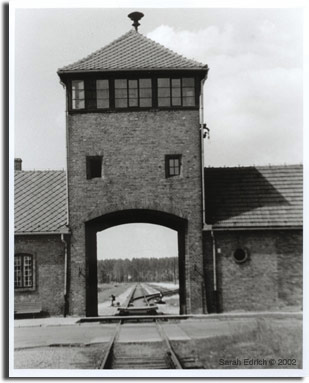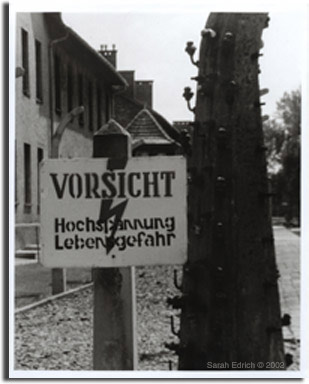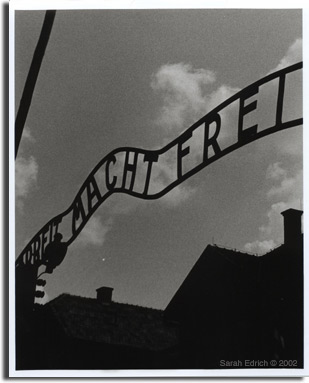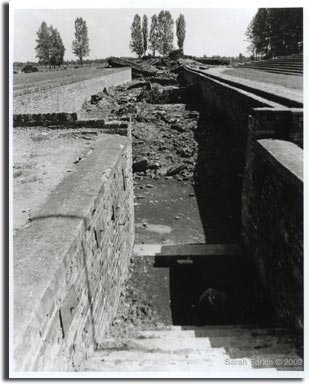|
Ten months earlier I had mentioned to my
dad that I was planning to go to Europe that summer and wanted to go to
Auschwitz. It was something I felt I should do, I explained, not only
to pay my respects to victims of the Nazi death camps, but because of
my religion. Though I am more culturally Jewish than religiously observant,
I had traveled in Israel three years earlier and came away from that trip
with an appreciation for my faith and my ancestors that years of religious
school had failed to instill. The next year, during a trip to Prague,
my sister and I went to Terezin; Auschwitz-Birkenau seemed like the logical,
albeit grim, next step.
 My
father, a man who hates to fly and had not been overseas for nine years,
decided to accompany me; my mother had to work and couldn’t join
us. I was surprised but also excited by my father’s decision; he
and I generally got along incredibly well, and I was anticipating an interesting
trip. We decided to go to Poland first to get the hardest part over with,
and then spend the next ten days moving west through Prague, Paris, and
London. So there we were, kilometers away from the hardest part, and all
I felt was trepidation. Heading back to Krakow was looked like a viable
alternative all of a sudden. My trepidation was related not so much to
our destination but to my companion. I knew that touring Auschwitz-Birkenau
would be difficult, but I also knew that there was a limit to how much
I could prepare emotionally. At least, as far as seeing the actual camps
went. There was no way I could prepare myself, emotionally, intellectually
or otherwise, for the possibility that my father would fall apart. My
father, a man who hates to fly and had not been overseas for nine years,
decided to accompany me; my mother had to work and couldn’t join
us. I was surprised but also excited by my father’s decision; he
and I generally got along incredibly well, and I was anticipating an interesting
trip. We decided to go to Poland first to get the hardest part over with,
and then spend the next ten days moving west through Prague, Paris, and
London. So there we were, kilometers away from the hardest part, and all
I felt was trepidation. Heading back to Krakow was looked like a viable
alternative all of a sudden. My trepidation was related not so much to
our destination but to my companion. I knew that touring Auschwitz-Birkenau
would be difficult, but I also knew that there was a limit to how much
I could prepare emotionally. At least, as far as seeing the actual camps
went. There was no way I could prepare myself, emotionally, intellectually
or otherwise, for the possibility that my father would fall apart.
 Through
ten months of planning for this trip, my father often mentioned that he
was worried about being unprepared, emotionally, to see the camps. He
had read just as much, if not more, Holocaust literature as me, and as
an avid student of history he knew the context and the statistics. This
knowledge seemed to reinforce, rather than alleviate, his sense of being
unprepared, and I was worried that seeing the tangible remainders of a
horrible event would be too much for him. My trips to Israel and Terezin
had given me some idea about how to handle the camps, but my father had
no such experiences to draw from. He just had his memories of living as
a child in Germany after World War Two, of the Anti-Semitism he had encountered
in the United States, and his knowledge that we were in a country where
so many of our faith, including relatives, had perished. Through
ten months of planning for this trip, my father often mentioned that he
was worried about being unprepared, emotionally, to see the camps. He
had read just as much, if not more, Holocaust literature as me, and as
an avid student of history he knew the context and the statistics. This
knowledge seemed to reinforce, rather than alleviate, his sense of being
unprepared, and I was worried that seeing the tangible remainders of a
horrible event would be too much for him. My trips to Israel and Terezin
had given me some idea about how to handle the camps, but my father had
no such experiences to draw from. He just had his memories of living as
a child in Germany after World War Two, of the Anti-Semitism he had encountered
in the United States, and his knowledge that we were in a country where
so many of our faith, including relatives, had perished.
 The
parking lot at Auschwitz was innocuous enough; the entry hall served as
both an information center and a small museum, which we walked through
quickly. As we stepped out into the courtyard, I was slightly ahead of
my father and did not see his expression as he took in the neatly swept
grounds. But I heard his gasp and turned quickly to see him standing stock-still,
hand over his mouth, eyes obscured by sunglasses. After that one intake
of breath, he seemed a statue. I didn’t know what to do; I wished
that my mom were there. The
parking lot at Auschwitz was innocuous enough; the entry hall served as
both an information center and a small museum, which we walked through
quickly. As we stepped out into the courtyard, I was slightly ahead of
my father and did not see his expression as he took in the neatly swept
grounds. But I heard his gasp and turned quickly to see him standing stock-still,
hand over his mouth, eyes obscured by sunglasses. After that one intake
of breath, he seemed a statue. I didn’t know what to do; I wished
that my mom were there.
“Are you OK?” I asked stupidly. “Do
you want to sit down?” My dad nodded, but then recovered himself.
If there were tears in his eyes I couldn’t tell, and I was glad
for that. We slowly passed under the infamous Arbeit Macht Frei (“work
is freeing”) sign that heralded the entrance to Auschwitz. We spent
the next several hours taking black and white pictures and lost in our
own thoughts.
 My
impressions of the camps themselves are few. The sign was smaller than
I imagined, the gas chambers were silent and eerie, and the small patch
of land where ashes of the victims lay was terrifyingly real. In those
hours, I could not go beyond surface impressions because I knew that if
I actually thought about what we were seeing and what it meant, I would
be the one to fall apart. All of my energy was focused on my father: walking
next to him, asking banal, historical questions, and listening to his
despairing comments about the loss of life and the nature of evil. If
I provided any support for him with my attention, he gave me just as much
by allowing me to step back from the horror of the past and concentrate
instead on the urgency of the present. My
impressions of the camps themselves are few. The sign was smaller than
I imagined, the gas chambers were silent and eerie, and the small patch
of land where ashes of the victims lay was terrifyingly real. In those
hours, I could not go beyond surface impressions because I knew that if
I actually thought about what we were seeing and what it meant, I would
be the one to fall apart. All of my energy was focused on my father: walking
next to him, asking banal, historical questions, and listening to his
despairing comments about the loss of life and the nature of evil. If
I provided any support for him with my attention, he gave me just as much
by allowing me to step back from the horror of the past and concentrate
instead on the urgency of the present.
- Sarah Erdreich
|
